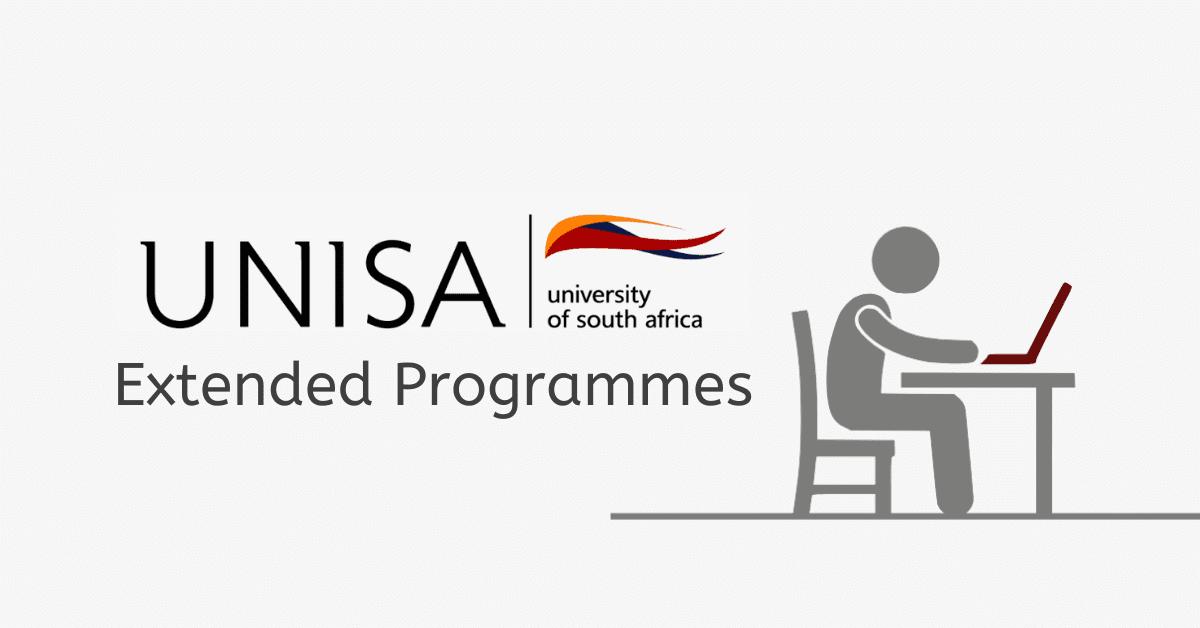How to Apply For Extended Programmes At UNISA online – University of South Africa. Extended programmes are streams within regular diploma or bachelor degree qualifications which are offered over a longer period than the formal time for regular programmes. On completion of an extended programme, students are awarded the same diploma or degree certificate as students in the regular streams within a qualification. The rationale behind the extended period of learning is to accommodate additional learning support

How to apply for extended programmes at UNISA?
The purpose of extended programmes is to ensure students get an understanding of their course and also look beyond the usual assignments. This provides a comprehensive experience and a different range of courses.
When an activity from the extended programme, like projects, comes out, it tends to motivate students to develop certain skills and approaches towards societal problems.
If you are interested in extended programmes at UNISA, then this is the time to try them. Students and applicants can use this guide as a way to apply for extended programmes at UNISA.
Extended programmes are not easily applied for; once you choose a particular discipline, you may be allowed to register for an extended programme within your scope. These registration processes are considered part of the application process. During the registration process, the modules are automatically added to your credit hours, but as indicated, the credit hours associated with extended programmes are quite different.
Students who wish to apply for an extended programme can email their departmental and faculty head requesting to take extended programmes.
How long is an extended Programme?
The extended programmes at UNISA are known for having modules that last for a calculated time. Extended programmers are different from regular programmes in that they are spread out over the course of a year, as opposed to being completed within a single semester.
By having an extended timeline, students can really dive into the subject matter and gain a better understanding of complex concepts. This extra time also allows them to build a stronger foundation of knowledge and the entire course.
One of the key features of the extended programmes is that they prioritise giving students plenty of time to study. No matter the course or module you have, you get the needed amount of time.
Extended programmes demand twice the amount of regular credit hours as compared to regular modules.
Extended programmes can take about two years which is considered two academic years. In some cases, there are within an academic year, compromising two full semesters.
What is an extended programme qualification?
UNISA’s extended programmes are the longer version of the regular diploma and degree qualification. There are regulated to be completed over a longer period than the regular qualification.
If you apply for an extended, there is the likelihood of receiving a certificate at the end of the study period.
The extended programme qualification covers the degree and diploma. These are more like the dominant qualification at UNISA. And as part of the goals of the extended programmes, they add extra value to the course pursued at UNISA.
Download PDF Qualifications with extended programmes
Is the extended Programme a bridging course?
Many prospective applicants who have not been through UNISA’s educational systems confuse themselves with an extended programme and a bridging course.
Not only prospective applicants but sometimes students cannot differentiate between these two.
There is a big difference between an extended programme and a bridging course. These two are not the same.
In terms of qualification procedure, timeline, and general scope, extended programmes are not considered bridging courses.
UNISA extended programme
The rationale behind the extended period of learning is to accommodate additional learning support.
The general regulations stipulated for a regular qualification apply. In addition, the following regulations are specific to the extended programmes:
- In the first and second years of study, students are restricted to a maximum of 60 credits of prescribed, sequenced modules.
- At least 50% of the first and second-year curriculum is made up of extended (year) modules, with foundation provisions.
- The minimum number of years required to complete a full extended programme is one year, plus the approved minimum formal time for the regular programmes.
- The maximum number of years required to complete a full extended programme is one year, plus the approved maximum formal time for the regular programme.
The normal rules that regulate progression (including repeats in modules) within the qualification will apply.
Benefits of the Extended Science Pathway
If you are in the Extended Science Pathway, you have access to a range of learning support interventions. For you to benefit fully, though, you will need to put in some extra effort into your studies. You can do this by simply taking advantage of all the additional support activities that we will provide for you.
Upon registration for a science qualification, you will immediately be linked to an e-tutor who will mentor you and provide academic support. You will have access to special tutorial sites for each Science Foundation module on Unisa’s electronic learning platform, myUnisa, where you will interact with the e-tutor and with other students enrolled for the same subject.
To find out more about the qualifications and modules with an Extended Science Pathway, admission to the Extended Science Pathway, and the additional support offered for these modules, read more in the Extended Science Pathway document (PDF).
Originally posted 2024-02-02 15:52:42.
